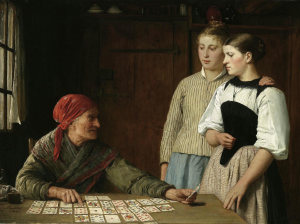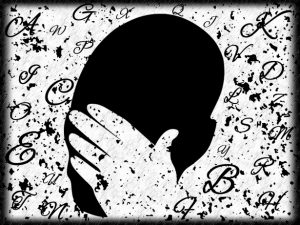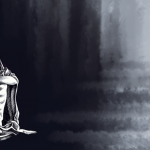
10 Lies Depression Tells You (Part 1)
Depression is one of the most commonly diagnosed mental illnesses and is the leading cause of disability worldwide[i]. While it can take many forms and show up differently in each individual, there are many common factors that can make depression particularly debilitating.
One important step to take in recovering from depression (or any mental illness, for that matter) is to be able to separate yourself from the illness in some way (you can read more about this idea here). When we create some distance between ourselves and our problems, we are able to see them more clearly, which allows us to relate to them differently or otherwise manage them more effectively. If you happen to be suffering from depression yourself, I hope that reading this list of “10 Lies Depression Tells You” will help you in your recovery.
Lie #1: You are defective.
Depression likes to speak in highly personalized, absolute statements – usually directed in a damning, negative way towards you. It may try to convince you in one way or another that there is something horribly and permanently wrong with you. It may show up in the form of self-critical thoughts like “I’m so screwed up,” “I’m a failure,” “I’m a loser,” or it may sound like an inner critic who says things like “you are broken” or “you’re so useless.” To make matters worse, these thoughts tend to feel more true than alternative thoughts or thoughts to the contrary (e.g. “I’m doing alright” or “I’m generally a good person”). This is because depression uses a sneaky tool called emotional reasoning to convince you that what it tells you is the truth (see Lie #4 for more about this). These kinds of statements, feelings, and thinking patterns all serve to reinforce one central, false belief: that you, in your entirety as a person and a human being, are the problem.[perfectpullquote align=”right” bordertop=”false” cite=”Michael White and David Epston” link=”” color=”” class=”” size=”20″] “The problem is the problem, the person is not the problem.” [/perfectpullquote]
The truth is that while you may be suffering from depression, you, yourself, are not only the depression that you’re experiencing. There is more to you than your feelings (or lack of feelings), low energy levels, negative thinking, irritability, suicidal thoughts, or lack of motivation. These experiences are all part of what you may be struggling with, but they are not all of who you are. There may be parts of you that aren’t working so well in this moment or that cause you trouble at times in your life, but there are also other parts of you that work quite well. You have strengths, talents, and inner resources that are quite distinct from the depression – even if it may be hard to see them or to access them right now.
Lie #2: This is the “real you.”
Depression is much more than a list of symptoms, a mood-state, or patterns of thinking; clinical depression can be an all-encompassing state of being that shapes a person’s sense of reality. One of the most damaging ways that depression can trick people is by convincing them that their “true self” is the depression or that their “natural state” is to be depressed. Depression may tell you things like “this is who you really are,” as if your personality and sense of self is defined by being “a depressive.” It will welcome you to describe yourself as a “depressed person” instead of a person suffering from depression. It may tell you that moments where you were more sociable or outgoing were “just an act,” that your accomplishments “don’t count,” or that times when you weren’t as depressed were “just a fluke” (this is a common cognitive distortion called discounting the positive).
The truth is that who you are cannot be defined exclusively by your depression. Even if you felt depressed 100% of the time, you as a person still wouldn’t be 100% your depression. The evidence is the fact that you’re alive and reading this right now (the depression probably wouldn’t want you to do that). You do have moments where you get out of bed, or eat food, or make even the tiniest efforts in your life. If you were only the depression, you wouldn’t do any of those things. And the days that the depression seems to “win” don’t count more than the days that it doesn’t. Both your successes and your failures are equally “real.” Feelings of hopelessness, despair, or numbness don’t count more than feelings of calm, contentment, or joy. Every moment of your life is equally your life, and you are still you, whether you are depressed or not.
Lie #3: You have always felt this way and you will always feel this way.
When in a depressed state, especially when you’ve been in it for quite some time, it may feel like an eternity. Depression will give you a sense that not only are you depressed right now, but that you have always been depressed. This is because it makes it harder for you to access memories and experiences that occurred during times that you weren’t experiencing depression. It will also tell you that you will always be depressed – that this is as good as it gets.  It will tell you things like “there’s no hope for you,” “you can’t change,” and “you’ll never get better” (like a very discouraging fortune teller). Essentially, depression will lie to you by telling you that the current mood you’re feeling is the only mood that you’re capable of, and therefore your entire life will feel exactly like this.
It will tell you things like “there’s no hope for you,” “you can’t change,” and “you’ll never get better” (like a very discouraging fortune teller). Essentially, depression will lie to you by telling you that the current mood you’re feeling is the only mood that you’re capable of, and therefore your entire life will feel exactly like this.
The truth is that there were likely at least some moments in your past when you weren’t depressed, or when you weren’t feeling quite as terribly as you feel right now. There may have been many moments where you felt differently, even in the recent past, but depression will lie to you and tell you that those times never happened. Or if you can acknowledge that you haven’t always been depressed, it will try to convince you that those times “don’t count” for some reason. Furthermore, depression doesn’t have a crystal ball that can see your future any more than you do. There is no way to know how you will feel tomorrow, or in a week from now, or in a year from now. There are many different treatments for depression, from psychotherapy to medications to support groups to physical exercise (just to name a few), that can and do make a difference in people’s lives. In addition, many people with depression seem to come out of it on their own simply over the course of time.
Lie #4: You can’t do anything as long as you feel this way.

Depression loves to use emotional reasoning to convince people that they are powerless and helpless. Emotional reasoning is the argument that basically says, “you feel this way, therefore you must act accordingly.” Depression can make you feel like you want to stay in bed, stay at home, isolate, hide from the world, or curl into a ball and disappear. It may tell you that you can’t pick up the phone, you can’t seek help, you can’t go outside, or you can’t do anything to help yourself because you feel so depressed. It may try to convince you that you need to feel better in order to take action in your life. Unfortunately, this type of reasoning is usually completely backwards when it comes to recovering from depression.
It’s a basic psychological principle that attitudes shape behaviours, and that behaviours can also shape attitudes. If we act contrary to how we feel, we can often change the way we feel. If we do this enough times, we can change the way we think, and even change our beliefs over time. If you disobey one of the commands that depression gives you, you weaken its grip on you and empower yourself. If you choose to go outside for a walk when it tells you “you feel so bad that you need to stay at home alone today,” you are essentially proving the depression wrong. If you do this enough times, you will start to learn that the depression is constantly telling you that you are less capable than you actually are. The truth is that you can do much more than you think you can – even when you feel terrible.
Lie #5: It’s all your fault.
One of depression’s favourite hobbies is blaming people for everything that goes wrong in their lives. If you’re depressed, you are likely familiar with the experience of unfair self-criticism. Did you get stuck in traffic? “You should have taken another route.” Did you forget your umbrella and get rained on? “You should have brought an umbrella” (depression loves to use the word “should” to criticize and “should on you”). That job interview didn’t go as well as you would have hoped? “It’s because you’re stupid – why do you even try?” Depression can and will find a way to make every unpleasant or unfortunate event in your life your fault and your fault alone. It will probably even blame you for the fact that you’re depressed, telling you it’s because you are “lazy,” “undisciplined,” “a loser,” or “you don’t try hard enough.”
[perfectpullquote align=”left” bordertop=”false” cite=”Alexander Pope” link=”” color=”” class=”” size=””]“To err is human.”[/perfectpullquote] A more balanced perspective might be to acknowledge that fact that you’re a human being and therefore imperfect and likely to make mistakes in your life. You aren’t powerful enough to cause all of the negative events in your life – many of them will happen due to circumstances beyond your control. Nor are you powerful enough to foresee and prevent all the mistakes you might make; if you were, you wouldn’t be capable of making mistakes anymore, and you wouldn’t be a human being! It’s absolutely not your fault that you experience depression. This doesn’t mean, however, that you are powerless or can’t assume responsibility for yourself and your life. In fact, assuming responsibility for what is in your control is an essential part of recovery and maintaining wellness.
Click Here for Part 2 of “10 Lies Depression Tells You”…
[i] http://www.who.int/news-room/fact-sheets/detail/depression



